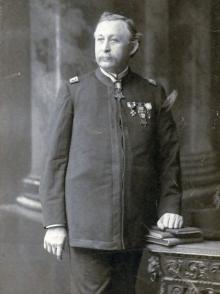- COVID-19 Project
- Home
- Archival Material
- College History Projects
- Subject-Based Digital Projects
- Carlisle Indian School Resources
- LGBT History Project
- Three Mile Island (TMI) Resources
- Civil War Resources
- James Buchanan Resources
- Slavery and Abolition in the U.S.
- Russian and Slavic Resources
- AIFS / AIFS Foundation Collection
- Books of Isaac Norris
- Writings by Dickinsonians
- Digital Images on Flickr
- Dickinson @ Internet Archive
Horatio Collins King (1837-1918)

Birth: December 22, 1837; Portland, Maine
Death: November 15, 1918 (age 81);Brooklyn, New York
Military Service: USA, 1861-65
Unit: Army of the Potomac, First Cavalry Division of the Army of the Shenandoah
Alma Mater: Dickinson College, B.A. (Class of 1858); Trustee, 1896-1918
Horatio Collins King was born on December 22, 1837 in Portland, Maine, to Horatio and Anne Collins King. The elder King served as postmaster general in the cabinet of James Buchanan. Horatio Collins King was prepared at Emory and Henry College. In 1854 he entered Dickinson College, where his uncle Charles Collins was president. While there, he was a member of Phi Kappa Sigma and the Union Philosophical Society. He earned a bachelor's degree in 1858; King was later inducted into Phi Beta Kappa when a chapter was established at Dickinson in 1886. Following his graduation, King studied law for two years with Edwin M. Stanton, later secretary of war, and in 1861 moved to New York City. He was admitted to the New York State Bar that same year.
War erupted and King sought a commission in the United States Army. In 1862 he received his appointment as assistant quartermaster of volunteers with the rank of captain in the Army of the Potomac from his former mentor Stanton. He was soon promoted to chief quartermaster of the First Cavalry Division of the Army of the Shenandoah. He took part in five battles following this appointment, and he was recommended for promotion because of gallantry at the Battle of Five Forks. King was honorably discharged in October 1866 with the brevets of major, lieutenant colonel, and colonel. He returned to the practice of law in New York City until 1871, when he assumed the position of associate editor at the New York Star. King then became publisher of the Christian Union with his close friend, Reverend Henry Ward Beecher, as editor. He also helped to edit The Christian at Work. In 1874, King returned to his law practice and remained active in the profession for the remainder of his life.
King joined the National Guard of New York in 1876 and was elected major of the Thirteenth Regiment. He was appointed judge advocate for the Eleventh Brigade in 1880 and, in 1883, was appointed by Governor Grover Cleveland to be judge advocate general, with the rank of brigadier general, in the National Guard, State of New York. He served as secretary of the Society of the Army of the Potomac from 1877 to 1904 and as president of the organization in 1904. He was a member of the Order of Elks, a Mason, and a charter member of the New York Commandery of the Military Order of the Loyal Legion. King was also an active member of the Grand Army of the Republic, serving two years as post commander and one year as department judge advocate general. King served for ten years as a member of the Brooklyn Board of Education and a member of the New York Monuments' Commission. King ran for Secretary of State of New York in 1895 on the Democratic ticket, but was defeated. He then ran for Congress in 1896 for the Sound Money Party, but was again defeated. When later nominated for office, King declined.
King served as a trustee of Dickinson College from 1896 to 1918, and is perhaps best known by the college as the author of numerous school songs including Dickinson's Alma Mater, "Noble Dickinsonia." He received an honorary doctor of laws degree from Allegheny College in 1897, and in the same year, Horatio Collins King was awarded the Congressional Medal of Honor for "conspicuous gallantry" while serving with the cavalry in March 1865 near Dinwiddie Court House.
King married Emma Carter Stebbins, daughter of New York merchant Russell Stebbins, in October 1862. Following Emma's death around the conclusion of the Civil War, he married Esther Augusta Howard (1845-1925), the daughter of Captain John T. Howard with whom King had served during the War, in June 1866. He and Esther had nine children and resided in Brooklyn, New York, for much of their lives. Horatio Collins King died on November 15, 1918 in Brooklyn, New York and is buried at Green-Wood Cemetery in Brooklyn.
For more information please look at,
"Gen. Horatio C. King Dies In 81st Year," New York Times, November 16, 1918, p. 13.
“King, Horatio Collins,” The National Cyclopaedia of American Biography (New York: James T. White & Company, 1896), 6: 193.
Kates, David Aaron. "Horatio Collins King's "Journal of My College Life, Comprising love, foolishness and the like." John and Mary's Journal 13 (2000): 19-31.
New York Monuments Commission, In Memoriam, James Samuel Wadsworth, 1807-1864 (Albany: J.B. Lyon Company, Printers, 1916), 56.
Date of Post:
2013
College Relationship:
Alumnus/Alumna Class Year:
Trustee - Years of Service:
1896-1918
Honorary Degree - Year:
1896